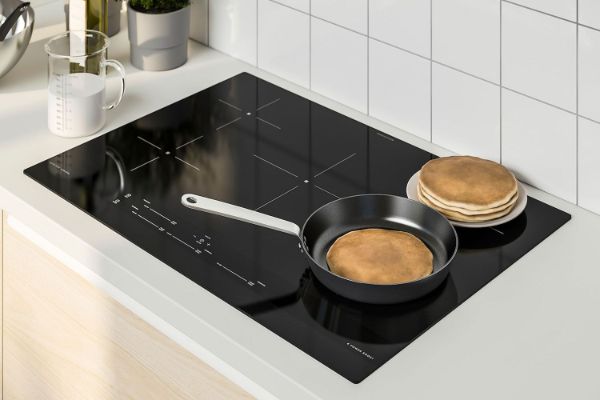Ah, the heart of the kitchen – the cooktop. But wait, there are two contenders in this culinary arena: induction and electric cooktops. If you’re feeling a bit befuddled about which one is which, fear not.
We’re about to break it all down for you in the ultimate induction vs. electric cooktop showdown. Let’s dive in and unravel the culinary mysteries!

Table of Contents
Understanding Induction Cooktops: The Futuristic Magic
Induction cooktops might sound like something straight out of a sci-fi flick, but they’re actually quite real and incredibly efficient. These cooktops use electromagnetism to heat your pots and pans directly. How does this magic work? Let’s break it down:
Pros of Induction Cooktops
- Speedy Heating: Induction cooktops are the Usain Bolts of the kitchen. They heat up ridiculously fast, getting your water to a boiling point quicker than you can say “dinner’s ready!”
- Precision Cooking: Remember that electromagnetic magic? It offers precise and immediate temperature control. No more waiting for the burner to cool down when you turn the dial.
- Safety First: Here’s where the magic gets even cooler. Induction cooktops only heat up the cookware, not the cooktop surface itself. That means no more accidental burns from touching a hot burner.
- Energy Efficiency: Induction cooktops are like the energy-saving superheroes of the kitchen. They transfer heat directly to the pot, wasting very little energy in the process.
Cons of Induction Cooktops
- Cookware Compatibility: To dance the induction tango, you need the right partner – magnetic cookware. If your pots and pans aren’t magnetic, they won’t work on an induction cooktop.
- Initial Investment: While they save you money in the long run, induction cooktops can be pricier upfront compared to electric ones.
- Buzzing Sound: Some induction cooktops can emit a gentle buzzing sound during operation, which might take a bit of getting used to.
Decoding Electric Cooktops: The Classic Approach
Electric cooktops might not have the technological magic of induction, but they’ve been the trusty workhorses of kitchens for years. These cooktops use electrical resistance to generate heat, giving you that familiar cooking experience.
Pros of Electric Cooktops
- Wide Cookware Compatibility: Electric cooktops are like the universal adapters of the cooking world. They work with almost all types of cookware, whether they’re magnetic or not.
- Affordable Entry: Electric cooktops tend to have a lower initial cost compared to their induction counterparts, making them an accessible option for many.
- Familiarity: If you’ve cooked on electric cooktops before, there’s a level of familiarity that’s comforting. No magnetic dance required – just put your pot on the burner and let the cooking commence.
Cons of Electric Cooktops
- Slower Heating: Electric cooktops take their sweet time heating up. You might find yourself tapping your foot while waiting for that pasta water to boil.
- Heat Distribution: Electric cooktops can have uneven heat distribution, leading to hot spots and potentially uneven cooking.
- Heat Retention: Once you turn off the burner, electric cooktops take a while to cool down. It’s like they’re holding onto that heat for dear life.
Spotting the Differences
- Cookware Test: The simplest way to tell the difference is with a magnet. If your cookware sticks to the cooktop, it’s induction-friendly. If not, it’s for electric cooktops.
- Speed Check: Turn on a burner and time how long it takes to boil a pot of water. If it’s quicker than a squirrel on caffeine, you’re dealing with an induction cooktop.
- Control Freaks: Check the control panel. If you see specific temperature settings rather than just a range of numbers, it’s likely an induction cooktop.
- Smooth or Coiled: Induction cooktops often have a smooth, glass-ceramic surface, while electric cooktops might have coiled heating elements visible beneath.
The Verdict: Cooking Your Way
So, which cooktop should you choose? It all boils down to your cooking style, preferences, and budget.
Induction Cooktop: Go for it if you’re all about efficiency, precision, and a sleek, modern look. If you’ve got the right cookware and are willing to invest a bit more upfront, induction could be your culinary companion.
Electric Cooktop: If you prefer versatility, a more affordable option, and a cooking method you’re familiar with, electric cooktops are a classic choice.
Remember, the best cooktop is the one that aligns with your culinary needs and lifestyle. Whichever one you choose, get ready to whip up some deliciousness – and maybe even impress your friends with your newfound cooktop knowledge!
